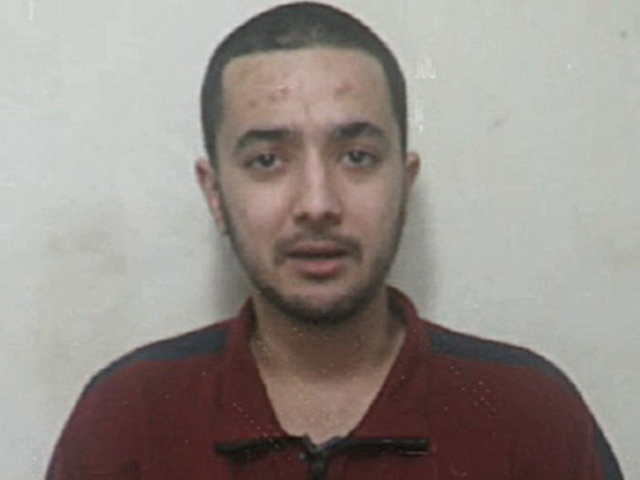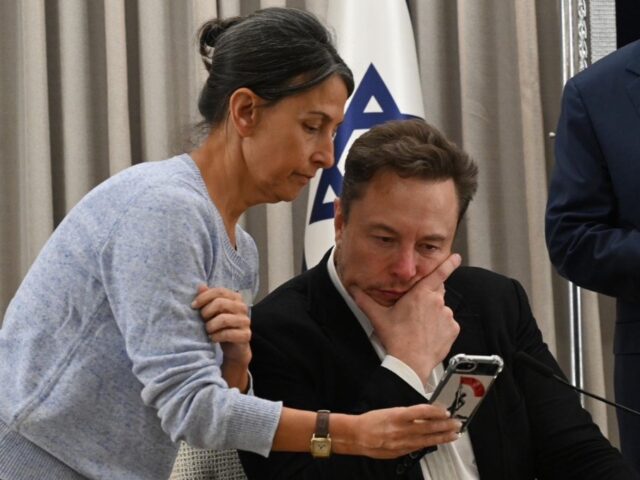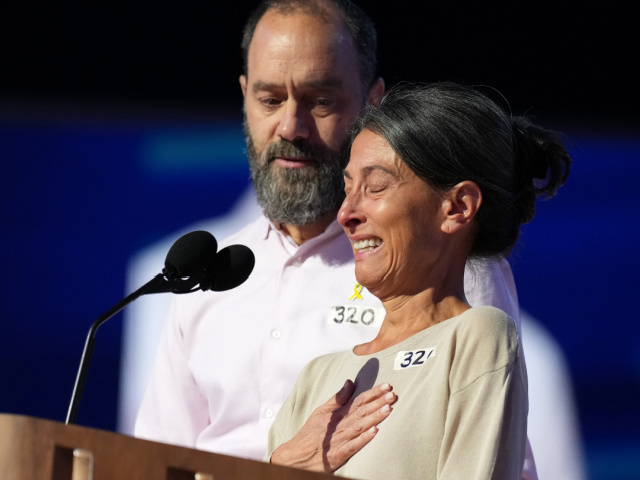
American-Israeli Hostage Hersh Goldberg-Polin Found Dead in Gaza, Murdered by Hamas
Hersh Goldberg-Polin, 23, the American-Israeli hostage who lost his left hand when being abducted by Hamas from the Nova music festival on October 7, has been found dead in Gaza by Israeli Defense Forces (IDF) soldiers.
Goldberg-Polin was identified after news broke Saturday that the IDF had discovered a number of unidentified bodies in Gaza. Amid rumors spreading throughout Israel on social media, the IDF asked the public to wait before it had identified the bodies.
In a statement, the IDF said:
The IDF located a number of bodies during combat in the Gaza Strip. At this time, the troops are still operating in the area and are carrying out a process to extract and identify the bodies that will last several hours. We ask to refrain from spreading rumors.
Israel’s Army Radio announced Sunday morning local time that Goldberg-Polin had been identified as one of the dead. The immediate cause of death had not been identified.
Army Radio also announced that the family of Israeli hostage Ori Danino, 25, who had been abducted after saving people from the music festival, had also been identified as one of the dead. So, too, had Eden Yerushalmi, 24, an Israeli woman who had spoken with her family before being abducted from the festival.
Six bodies were found; the other three have not yet been identified as of the time of publication of this article.
Update: In a statement, the IDF and the Israel Security Agency (ISA) declared:
Yesterday (Saturday), the IDF and ISA located and recovered the bodies of the hostages Carmel Gat, Eden Yerushalmi, Hersh Goldberg-Polin, Alexander Lobanov, Almog Sarusi, and Master Sergeant Ori Danino, from an underground tunnel in the Rafah area in the Gaza Strip and returned them to Israeli territory.
They were all taken hostage on October 7th and were murdered by the Hamas terrorist organization in the Gaza Strip.
Following an identification procedure carried out by the National Institute of Forensic Medicine, the Israel Police, and the IDF Military Rabbinate, the IDF Manpower Directorate’s Hostage team, which is responsible for accompanying the families of the hostages, notified their families. The IDF and ISA send their heartfelt condolences to the families.
The IDF and Israeli security forces are operating with all means to bring home all the hostages as fast as possible.
The voices of Army Radio announcers were heavy and near tears, despite the near-routine nature of military news.
“Our hearts are broken,” the Goldberg-Polin family said, thanking the public for their support and asking for privacy.
Horrible news I can’t imagine the pain his family is feeling right now, may they find strength through this time & May his memory be a blessing pic.twitter.com/9eAF0JRI20
— Sarai (Sarah Idan) Miss Iraq (@RealSarahIdan) September 1, 2024
Hersh was among the iconic hostages, featured prominently in demonstrations and even in graffiti on the walls of buildings in western Jerusalem, where he and his family lived after moving to Israel from the U.S. He had served in the armored corps of the IDF and was enjoying his free time after his military service when he was abducted.
Relatives and supporters raise placards and deploy a banner bearing portraits of Israeli hostage Hersh Goldberg-Polin, 23, and other hostages held in Gaza since the October 7 attacks by Hamas in southern Israel, during a rally calling for their release, outside the PM’s office in Jerusalem on May 22, 2024. (Photo by AHMAD GHARABLI / AFP) (Photo by AHMAD GHARABLI/AFP via Getty Images)
Goldberg-Polin appeared in a video released by Hamas in April as part of its effort to exert psychological pressure on the Israeli public and the Israeli government to force a hostage deal on unfavorable terms. He appeared thin, but alive.
Goldberg-Polin’s parents lobbied politicians around the world for his freedom, meeting with President Joe Biden and with prominent visitors to Israel such as Elon Musk.
Rachel Goldberg-Polin, mother of Hersh Goldberg-Polin, shows Elon Musk footage of her son’s abduction. He lost an arm in the Hamas terror attack of October 7 and remains a hostage. (Haim Zach / GPO)
They also spoke at the Democratic National Convention in Chicago earlier this month, and gave a moving address in which they pleaded for help for the hostages, regardless of politics. (The parents of Omer Neutra, another American-Israeli hostage, spoke at the Republican National Convention in Milwaukee last month.)
Jon Polin and Rachel Goldberg, parents of Hersh Goldberg-Polin, become emotional as they arrive to speak on stage during the third day of the Democratic National Convention at the United Center on August 21, 2024 in Chicago, Illinois. Delegates, politicians, and Democratic Party supporters are in Chicago for the convention, concluding with current Vice President Kamala Harris accepting her party’s presidential nomination. The DNC takes place from August 19-22. (Photo by Andrew Harnik/Getty Images)
President Biden made an unusual comment Saturday about the discovery of the unidentified bodies, asking for patience until the families had been notified. It now appears that he had been told that Goldberg-Polin was among the dead.
In a statement Saturday evening local time in Washington, DC, Biden mourned Goldberg-Polin’s death:
Earlier today, in a tunnel under the city of Rafah, Israeli forces recovered six bodies of hostages held by Hamas. We have now confirmed that one of the hostages killed by these vicious Hamas terrorists was an American citizen, Hersh Goldberg-Polin.
I am devastated and outraged. Hersh was among the innocents brutally attacked while attending a music festival for peace in Israel on October 7. He lost his arm helping friends and strangers during Hamas’ savage massacre. He had just turned 23. He planned to travel the world. I have gotten to know his parents, Jon and Rachel. They have been courageous, wise, and steadfast, even as they have endured the unimaginable. They have been relentless and irrepressible champions of their son and of all the hostages held in unconscionable conditions. I admire them and grieve with them more deeply than words can express. I know all Americans tonight will have them in their prayers, just as Jill and I will. I have worked tirelessly to bring their beloved Hersh safely to them and am heartbroken by the news of his death. It is as tragic as it is reprehensible. Make no mistake, Hamas leaders will pay for these crimes. And we will keep working around the clock for a deal to secure the release of the remaining hostages.
The Biden administration had opposed Israel’s incursion in Rafah. Israel proceeded anyway, convinced that some of the hostages were being held there, and that Hamas leaders were hiding underneath the city.
Update: IDF spokesman Rear Admiral Daniel Hagari told reporters that troops had found the bodies a kilometer away from where a Bedouin Israeli Arab Muslim hostage, Qaid Farhan al-Qadi, had been rescued last week.
Al-Qadi informed soldiers about the possible location of other hostages.
Hagari said it was not yet clear whether Hamas had murdered the other hostages in response to the rescue. But he said that it was clear the hostages had been murdered by Hamas.
“They were cruelly murdered moments before we were able to reach them,” he said, hinting at a rescue operation.
This story is developing.
Joel B. Pollak is Senior Editor-at-Large at Breitbart News and the host of Breitbart News Sunday on Sirius XM Patriot on Sunday evenings from 7 p.m. to 10 p.m. ET (4 p.m. to 7 p.m. PT). He is the author of “”The Agenda: What Trump Should Do in His First 100 Days,” available for pre-order on Amazon. He is also the author of “The Trumpian Virtues: The Lessons and Legacy of Donald Trump’s Presidency,” now available on Audible. He is a winner of the 2018 Robert Novak Journalism Alumni Fellowship. Follow him on Twitter at @joelpollak.
Elizabeth Weibel contributed to this story.
Originally Posted At www.breitbart.com
Stay Updated with news.freeptomaineradio.com’s Daily Newsletter
Stay informed! Subscribe to our daily newsletter to receive updates on our latest blog posts directly in your inbox. Don’t let important information get buried by big tech.
Current subscribers:












